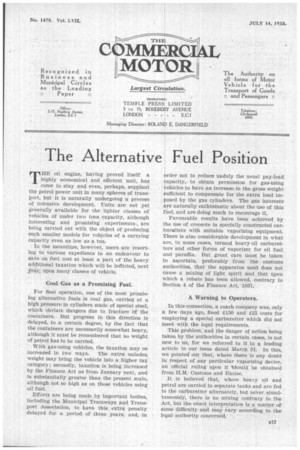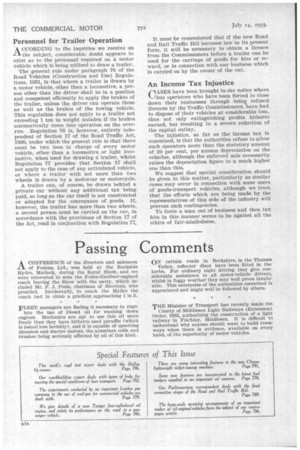The Alternative Fuel Position
Page 31

Page 32

If you've noticed an error in this article please click here to report it so we can fix it.
THE oil engine, having proved itself a highly economical and efficient unit, has come to stay and even, perhaps, supplant the petrol power unit in many spheres of transport, but it is naturally undergoing a process of intensive development. Units are not yet generally available for the lighter classes of Vehicles of under two tons capacity, although Interesting and promising experiments,„ are being carried out with the object of producing such smaller models for vehicles of a carrying capacity even as low as a ton.
In the meantime, however, users are resorting to various expedients in an endeavour to save on fuel cost at least a part of the heavy additional taxation which will be inflicted, next year, upon many classes of vehicle.
Coal Gas as a Promising Fuel.
For fleet operation, one of the most promising alternative fuels is coal gas, carried at a high pressure in cylinders made of special steel, which obviate dangers due to fracture of the containers. But progress in this direction is delayed, to a certain degree, by the fact that the containers are necessarily somewhat heavy, although it must be remembered that no weight of petrol has to be carried.
With gas-using vehicles, the taxation may. De Increased in two ways. The extra unladen weight may bring the vehicle into a higher tax category ; secondly, taxation is being increased by the Finance Act as from January next, and is substantially greater than the present scale, although not so high as on those vehicles using oil fuel.
Efforts are being made by important bodies, Including the Municipal Tramways and Transport -Association, to have this extra penalty delayed for a period of three years, and, in order not to reduce unduly the usual pay-load capacity, to obtain permission for gas-using vehicles to have an increase in the gross weightsufficient to compensate for the extra load imposed by the gas cylinders. The gas interests are naturally enthusiastic about the use of this fuel, and are doing much to encourage it.
Favourable results have been achieved by the use of creosote in specially constructed carbursitters with suitable vaporizing equipment. There is also considerable development in what are, in some cases, termed heavy oil carburetters and other forms of vaporizer for oil fuel and paraffin. But great care must be taken to asgertain, preferably from the customs authorities, that the apparatus used does not cause a mixing of light spirit and that upon which a rebate has been allowed, contrary to Section 4 of the Finance Act, 1931.
A Warning to Operators.
In this -connection, a coach company was, only a few days ago, fined £150 and £25 costs for employing a special carburetter which did not meet with the legal requirements.
This problem, and the danger of action being taken by the authorities in certain cases, is not new to us, for we referred to it in a leading article in our issue dated March 31. In this, we pointed out that, where there is any doubt in respect. of any particular vaporizing device. an official ruling upon it 'Should be obtained from H.M. Customs and Excise.
It is believed that; where heavy oil and petrol are carried in separate tanks and are fed to the carburetter alternately, but never, simultaneously, there is no mixing contrary to the ,Act, but the exact interpretation is a matter of some difficulty and may Vary according to the legal authorityconcerned.
Personnel for Trailer Operation
ACCORDING to the inquiries we receive on .the subject, considerable doubt appears to exist as to the personnel required on a motor vehicle which is being utilized to draw a trailer.
The general rule under paragraph 76 of the Road Vehicles (Construction and Use) Regulations, 1931, is that where a trailer is drawn by a motor vehicle, other than a locomotive, a person other than the driver shall be in a position and competent efficiently to apply the brakes of the trailer, unless the driver can operate these as well as the brakes of the towing vehicle. This regulation does not apply to a trailer not exceeding 1 ton in weight unladen if its brakes automatically come into operation on the overrun. Regulation 76 is, however, entirely independent of Section 17 of the Road Traffic Act, 1930, under which the general rule is that there must be two Men in charge of every motor vehicle, other than a locomotive, or light locomotive, when used for drawing a trailer, whilst Regulation 77 provides that Section 17 shall not apply to the case of any articulated vehicle, or where a trailer' with not more than two wheels is drawn by a motorcar or motorcycle.
A trailer can, of course, be drawn behind a private car without any additional tax being paid, so long as the car itself is not constructed or adapted for the conveyance of goods. If, however, the trailer has more than two wheels, a second person must be carried on the car, in accordance with the provisions of Section 17 of the Act, read in conjunction with Regulation 77. It must be remembered that if the new Road and Rail Traffic Bill becomes law in its present form, it will be necessary to obtain a licence from the Commissioners before a trailer can be used for the carriage of goods for hire or reward, or in connection with any business which is carried on by the owner of the car.
An Income Tax Injustice
CASES have been brought to +Sur notice where bus operators who have been forced to close down their businesses through being refused licences by the Traffic Commissioners, have had to dispose of their vehicles at considerable loss, thus not only extinguishing profits hitherto earned, but resulting in a severe reduction of the capital outlay.
The injustice, so far as the income tax Is concerned, Is that the authorities refuse to allow such operators more than the statutory amount of 20 per cent. per annum depreciation on the vehicles, although the enforced sale necessarily raises the depreciation figure to a much higher one than this.
We suggest that special consideration should be given to this matter, particularly as similar cases may occur in connection with some users of goods-transport vehicles, although we trust that the effortswhich are being made by the representatives of this side of the industry will prevent such contingencies.
To force a man out of business and then tax him in this manner seems to be against all the ethics of fair-mindedness.




























































































